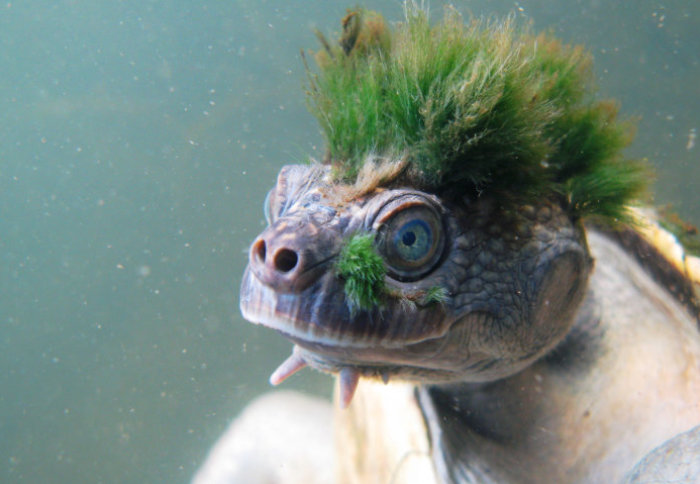7 times Imperial made you double-take in 2018

Some surprise headlines need a second look, and quirky studies can often have serious impact on our lives.
From holographic teachers to turtles that breathe through their genitals, here are a handful of the stories that made readers do a double-take in 2018.
Napoleon dynamite
 In August, research from Dr Matthew Genge revealed that electrically charged volcanic ash short-circuited Earth’s atmosphere in 1815 causing global poor weather – and Napoleon’s defeat at the Battle of Waterloo.
In August, research from Dr Matthew Genge revealed that electrically charged volcanic ash short-circuited Earth’s atmosphere in 1815 causing global poor weather – and Napoleon’s defeat at the Battle of Waterloo.
Historians know that rainy and muddy conditions helped the Allied army defeat the French Emperor. Now it appears this extreme weather may have been caused by a volcano named Mount Tambora on the Indonesian island of Sumbawa, which erupted spectacularly, plunging the Earth into a ‘year without a summer’ in 1816.
Read more: Napoleon’s defeat at Waterloo caused in part by Indonesian volcanic eruption
Holographic teaching
One of the more recent head-turning stories from the College. In November it was announced that Business School students will be the first in the world to have live lectures delivered to them via hologram.
The technology, developed by Toronto based hologram company AHRT Media and adapted by Imperial College Business School’s pioneering Edtech Lab, will enable faculty and guest speakers to present to students in real time, via a hologram link, from studios located in a variety of global locations including the US, Canada and Singapore. This one certainly caught the attention of the world’s media!
Read more: Imperial College Business School to offer live lectures via hologram
Spirit level
Eye-catching news for even the most modest of drinkers. In August, a team of international researchers, including Imperial scientists, published findings in the Lancet suggesting there is no safe level of alcohol. In short, no matter what, the health risks outweigh benefits.
Listen above for an audio clip about the research, or read more: There is no safe level of alcohol consumption, new global study confirms
Singing proudly
Participating in the Eurovision Song Contest may be linked to an increase in a nation’s life satisfaction. You read correctly, Imperial research released in May found that people were four per cent more likely to be satisfied with their life for every increase of 10 places on the final score board, for example their country finishing 2nd rather than 12th.
The research, published in the journal BMC Public Health, also found doing badly in the contest was associated with a greater increase in life satisfaction compared to not taking part at all.
Read more: Eurovision Song Contest associated with increase in life satisfaction
Poisoned chalice
Also in August (obviously the month for bizarre news from Imperial!) research revealed bumblebees acquire a taste for pesticide-laced food as they become more exposed to it – a behaviour showing possible symptoms of addiction.
The researchers tested the controversial class of pesticides the ‘neonicotinoids’, which are currently one of the most widely used classes of pesticides worldwide, despite the near-total ban in the EU.
Listen to Listen above for an audio clip about the research, or read more: The more pesticides bees eat, the more they like them
Shade balls

A bizarre-sounding story, but one with a significant impact. Research released in July by the Centre for Environmental Policy showed that preventing reservoir evaporation during droughts with floating balls may not help conserve water overall, due to the water needed to make the balls.
This ‘shade balls’ technique is widely used, such as during California’s latest drought, which lasted from 2011-2017, when 96 million of the balls were deployed on the Los Angeles reservoir to prevent evaporation. However the new research showed that producing the balls probably used more water elsewhere than was saved during their deployment – which could have knock-on environmental impacts.
Read more: Using ‘shade balls’ in reservoirs may use up more water than they save
Reptile risk

In April we learned that turtles which breathe through their genitals and tiny chameleons are amongst the weird reptiles heading for extinction unless urgent action is taken.
The strange species and news of their approaching demise caught the attention of the world’s media upon the release of the Zoological Society of London’s EDGE of Existence endangered species list – a study contributed to by Imperial authors.
Read more: Meet the weird reptiles at the short end of the evolutionary stick
–
Enjoy reading Imperial’s research and College news? Be the first to catch our stories with Imperial Today – the daily email bulletin of the College’s freshest online news and digital content. Sign up to Imperial Today.

Article text (excluding photos or graphics) © Imperial College London.
Photos and graphics subject to third party copyright used with permission or © Imperial College London.
Reporter
Andrew Youngson
Communications Division